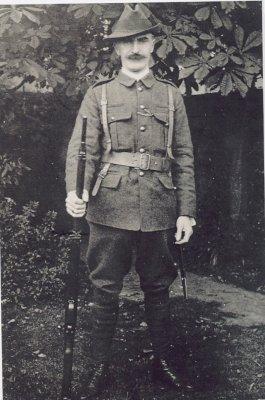Michael Joseph O’Rahilly (1875-1916)
Life
| 1875-1916 [born Micheal Joseph Rahilly; known as The O’Rahilly]; b. Ballylongford, Co. Kerry, 1875; son of wealthy shopkeeper; ed. Clongowes; studied medicine; travelled to America due to ill-health; m. in New York; returned to Ireland in 1909; became Sinn Féin and Gaelic League worker; invited Eoin MacNeill to write article entitled ‘The North Began’ in An Claidheamh Soluis (1 Nov. 1913) and afterwards asked Eoin MacNeill to lead Irish Volunteers on behalf of Bulmer Hobson and others; chairman of arms committee that organised the Howth gun-running; succeeded in smuggling 900 Mausers on the Asgard [of Erskine Childers], together with 26,000 rounds of ammunition; |
he envisaged using Óglaigh na hEireann as a defence force; appt. Director of Arms of secessionist Volunteers after Redmond’s call for enlistment, Sept. 1914; a supporter of MacNeill’s use of the Volunteers as pressure group, he was not a member of the IRB and remained unaware of plans for the 1916 Rising; availed of window in the law against importation of arms during August -December 1914 to add many guns including revolvers to the Volunteers’ armoury; did not favour blood-sacrifice; supported MacNeill’s countermand and spent Sunday carrying it to Limerick, but joined rebels at GPO having failed to avert their action; |
asked what he thought of the 1916 Rising, he said, ‘it is madness, but it is glorious madness’; wounded fatally in the face by machine gun fire leading a charge against a British Army barricade in Moore St. on the Friday of Easter Week; he lay in the street untended for 24 hours, and is reputed to have scrawled his name on the pavement in his own blood before dying [aetat. 41]; he left a widow and four children; Ronan O’Rahilly, a grandson, established the pirate radio-broadcaster Radio Caroline in the 1960s. DIB DIH |
 |
Director of Arms to the Irish Volunteers |
[ top ]
Criticism
Pádraig Ó Snodaigh [Oliver Snoddy], Ua Rathghaille (Baile Atha Cliath: Foillseacháin Poblachtacha 1967; rep. Dublin: United Irishman [1970]); Oliver Snoddy, ‘Notes on Literature in Irish Dealing with the Fight for Freedom’, in Éire-Ireland, 3, 2 (Summer 1968), pp. 138-48; Aodhagán O’Rahilly, Winding the Clock, O’Rahilly and the 1916 Rising (Dublin: Lilliput Press 1991), 254pp. [reviewed by Brendan Ó Cathaoir, Irish Times, [?] Aug. 1991, Weekend].
[ top ]
Commentary
W. B. Yeats, “The O’Rahilly”: ‘Sing of the O’Rahilly, / Do not deny his right; / Sing a “the” before his name; / Allow that he, despite / All those learned historians, / Established it for good; / He wrote out that word himself, / He christened himself with blood.;[...] ‘Then on Pearse and Connolly / He fixed a bitter look, / Because I helped to wind the clock I come to hear it strike.’ [...] ‘What remains to sing about / But of the death he met / Stretched under a doorway / Somewhere off Henry Street; / They that found him found upon / The door above his head / “Here died the O’Rahilly / R.I.P.” writ in blood.’ (Jan. 1937).
[ top ]
Augustine Martin, ed., Collected Poems of W. B. Yeats (London: Vintage 1992), contains the following note regarding “The O’Rahilly”: ‘The O’Rahilly (1875-1916 who styled himself in the old Gaelic manner as head of the O’Rahilly sept in Kerry was one of the more romantic figures of the Easter Rising. he led the charge up Moore Street - off Henry Street - when the garrison in the GPO had to abandon the building. When shot he is siad to have signed his name in blood on the nearby wall. he “travelled half the night from Kerry to reach Liberty Hall in time for the Rising. When he arrived he remarked that as he had helped to wind the clock he wanted to be there to hear it strike.’ (p.510.)
[ top ]
Arnold Bax described O’Rahilly as a ‘strikingly handsome young man always dressed in a saffron kilt’ (A. N. Jeffares, A New Commentary on the Poems of W. B. Yeats, 1984, p.389; bibl. Bax, Farewell My Youth, p.100).
[ top ]